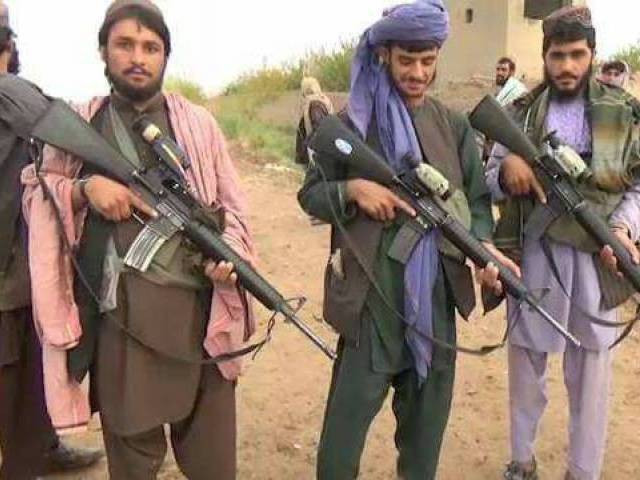Tolo TV attack rebrands Taliban as terrorists
AJF terms incident ‘violence against humanity’; group seen as brutal when opposed

A file photo of the Afghan Taliban. PHOTO: EXPRESS
While the media channel has a few lessons to learn about honest journalism, the Taliban’s actions have done nothing to alter the notion in the minds of Afghans that the group thinks peoples’ lives are dispensable, to be taken under the flimsiest of pretexts.
How free is the media?
The Taliban had publicly issued threats to Tolo TV – the leading channel in Afghanistan, as well as to 1TV, after they briefly captured hundreds of Taliban fighters trying to displace Afghan security forces in Kunduz in September. The Taliban took offence at their portrayal of the group, and said, “False allegations against the Mujahideens of the Islamic Emirate were mentioned.”

Talking to The Express Tribune, an insider revealed that Tolo TV tried to address Taliban concerns, for which an interaction took place between both sides in the United Arab Emirates, but to no avail.
On January 20, the day of the attack, Taliban Spokesperson Zabihullah Mujahid stated that the attack was not aimed at Tolo TV or “on the media, but on an intelligence network opposing our national unity, and our religious and national values.”
Not changing hearts and minds
If the Taliban were offended at media outlets for fallacious reporting, they could convey their protest formally and clarify the issue. However, the suicide bombing has now strengthened the notion among Afghans that there is no change in Taliban’s mentality, and that they will slay people for issues they cannot resolve.
The Taliban need to understand that Afghan people have suffered during 35 years of conflict imposed on them. Also, Afghans now favour the free flow of information, and that the group’s use of force will not deter freedom of expression.
At the same time, media groups in Afghanistan have a fundamental responsibility to maintain impartiality. There are certain reservations about the way a section of the Afghan media works, and powerful personalities can use that for political purposes.
The world condemns the attack
The assault was widely denounced in Afghanistan and abroad. The Afghanistan Journalists’ Federation (AJF) slammed the attack and termed it “an act of violence against humanity.” Speaking at a news conference on Thursday, the federation termed January 20 ‘Black Wednesday’, and said they are weighing options to respond to the Taliban action.
Media representatives also pushed the government to take action against security officials who failed to prevent the brutal attack.
In Kabul, UN Assistance Mission in Afghanistan (UNAMA) condemned the attack and said journalists, as civilians, may never be the object of attacks or threats. It also called on all parties, including the Taliban, to rescind any threats against the media.
UNAMA Deputy Special Representative for Afghanistan Tadamichi Yamamoto said, “Strong and independent journalism, free from intimidation and fear of criminal violence, is essential for a healthy democracy.” He added that Afghanistan has a flourishing media sector, and that steps must be taken to safeguard its freedom.
Human Rights Watch said the January 20 attack was an atrocity designed to undermine the media’s still-fragile freedom. It called upon anti-government insurgency groups to stop targeting civilians.
Tragic year
Nai Supporting Open Media in Afghanistan, that works to empower independent media, described 2015 as the worst year for freedom of speech and journalism in Afghanistan.
Media Watch recorded 95 cases of violence against journalists in Afghanistan in 2015. According to Nai, four journalists were killed in Afghanistan and forty others were either threatened or illegally summoned by state institutions, particularly the Office of the Attorney General and National Security Directorate. In contrast, there were 125 cases of violence against journalists registered in 2014.
Published in The Express Tribune, January 23rd, 2016.



















COMMENTS
Comments are moderated and generally will be posted if they are on-topic and not abusive.
For more information, please see our Comments FAQ